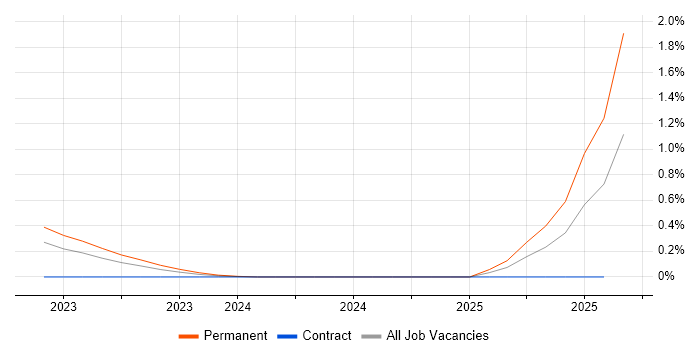Reinforcement Learning
West Yorkshire > Leeds
The table below provides summary statistics and salary benchmarking for jobs advertised in Leeds requiring Reinforcement Learning skills. It covers vacancies from the 6 months leading up to 14 September 2025, with comparisons to the same periods in the previous two years.
| 6 months to 14 Sep 2025 |
Same period 2024 | Same period 2023 | |
|---|---|---|---|
| Rank | 78 | - | 117 |
| Rank change year-on-year | - | - | - |
| Permanent jobs citing Reinforcement Learning | 1 | 0 | 6 |
| As % of all permanent jobs advertised in Leeds | 0.11% | - | 0.35% |
| As % of the Processes & Methodologies category | 0.13% | - | 0.37% |
| Number of salaries quoted | 1 | 0 | 2 |
| 10th Percentile | - | - | £82,500 |
| 25th Percentile | £68,000 | - | £84,375 |
| Median annual salary (50th Percentile) | £71,000 | - | £92,500 |
| 75th Percentile | £74,000 | - | £104,375 |
| 90th Percentile | - | - | £108,500 |
| West Yorkshire median annual salary | £71,000 | - | £92,500 |
All Process and Methodology Skills
Leeds
Reinforcement Learning falls under the Processes and Methodologies category. For comparison with the information above, the following table provides summary statistics for all permanent job vacancies requiring process or methodology skills in Leeds.
| Permanent vacancies with a requirement for process or methodology skills | 778 | 1,361 | 1,641 |
| As % of all permanent jobs advertised in Leeds | 85.78% | 77.99% | 96.08% |
| Number of salaries quoted | 524 | 889 | 1,213 |
| 10th Percentile | £30,000 | £32,900 | £31,250 |
| 25th Percentile | £42,500 | £42,500 | £42,500 |
| Median annual salary (50th Percentile) | £60,000 | £55,000 | £56,500 |
| Median % change year-on-year | +9.09% | -2.65% | +2.73% |
| 75th Percentile | £73,750 | £70,000 | £75,000 |
| 90th Percentile | £89,250 | £84,971 | £88,750 |
| West Yorkshire median annual salary | £55,000 | £55,000 | £55,000 |
Reinforcement Learning
Job Vacancy Trend in Leeds
Job postings citing Reinforcement Learning as a proportion of all IT jobs advertised in Leeds.

Reinforcement Learning
Co-occurring Skills and Capabilities in Leeds by Category
The follow tables expand on the table above by listing co-occurrences grouped by category. The same employment type, locality and period is covered with up to 20 co-occurrences shown in each of the following categories:
